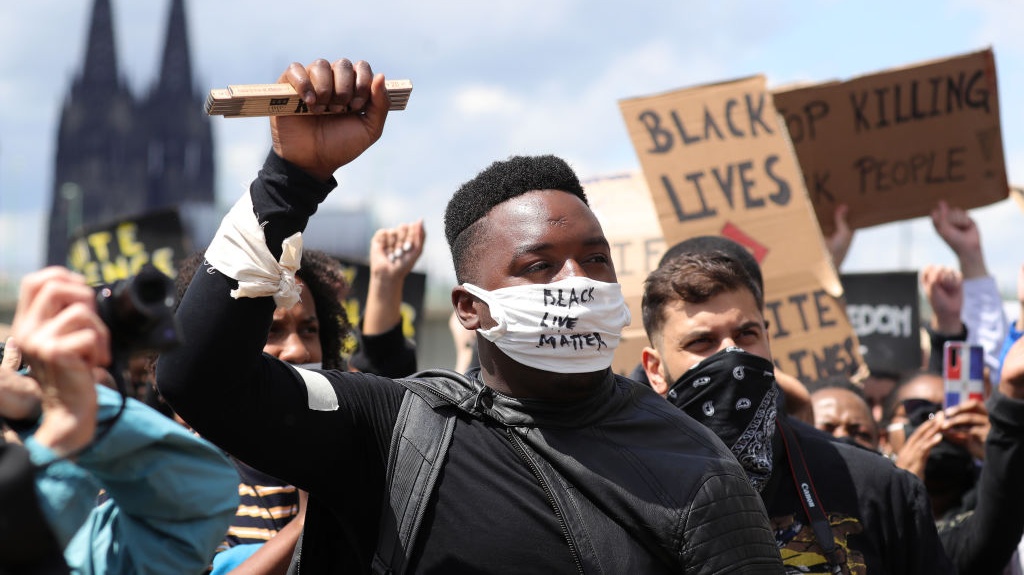If you’re interested in sharing your opinion on any cultural, political or personal topic, create an account here and check out our how-to post to learn more.
____
In the U.S., state violence follows the contours of our racialized society. Black people become the targets of police brutality because the U.S. has a tradition of anti-Black racism. Even with this being true, we should not confine ourselves by only using the language of anti-racism in our fight against police brutality. We should more deliberately internationalize our struggle against state violence.
In 1959, Dr. Martin Luther King Jr. visited India to study Mahatma Gandhi’s philosophy of nonviolence. Dr. King’s trip to India was able to link the civil rights struggle of the 1950s and 1960s to the movement for Indian independence. There has always been an interplay between framing the Black American struggle as a domestic racial justice issue and framing it as an international human rights issue. In our current struggle against police brutality, it may be time for us to rely more heavily on language which internationalizes our fight.
The U.S. positions itself as a global leader on issues of human rights. In August, the Trump administration imposed sanctions on Chinese officials because of China’s violent suppression of pro-democracy protests in Hong Kong. The Trump administration has condemned the Chinese government for beating and tear-gassing protestors, while conversely condemning U.S. protesters who have been beaten and tear gassed. The fact that some of the protests in Hong Kong have resulted in the destruction of property, at the hands of protesters, has not deterred the Trump administration from supporting Hong Kong's pro-democracy movement.
This summer, the Trump administration joined with other Western democracies and showed support for pro-democracy protests in Belarus. On September 8, the State Department released a statement condemning the “unjustified violence and repression by the Belarusian authorities, which included brazen beatings of peaceful marchers.” The president of the European Commission, Ursula von der Leyen, stated, “we [the European Union] stand by the people of Belarus, who want fundamental freedoms and democracy … The people of Belarus took peacefully to the streets and the authorities answered with violence, and this cannot be accepted.” U.S. protesters, who were met with violence, deserve this same kind of support. Ending the extrajudicial killings of Black Americans has to be as important as promoting democracy in Belarus and Hong Kong.
Our struggle to end police brutality is a struggle for human rights. When U.S. government officials attempt to delegitimize this movement against state violence, we should wrap ourselves in the language used by the State Department, to defend protests in Hong Kong and Belarus. If restraint should be used by the dictatorial government in Belarus, shouldn’t it be used by the world’s leading democracy? If police in Hong Kong should refrain from using tear gas and batons on protestors, shouldn’t police officers in the U.S.? If the destruction of property by some Hong Kong protestors does not invalidate the pro-democracy movement, how does a small number of instigators delegitimize our nonviolent movement, against police brutality?
The U.S. government cannot convincingly promote protest movements around the world while condemning protests which follow the routine extrajudicial killings of U.S. citizens. The continued killings of U.S. citizens by police delegitimizes U.S. foreign policy. No nation wants to be lectured about democratic principles by the U.S. when the U.S. does not respect protest movements within its own borders.
Dr. King saw the need for Black people in the U.S. to connect with movements around the world. By aligning our current movement to widely supported pro-democracy movements, we reframe our struggle as being more than just a fight to protect Black lives. Our struggle becomes a struggle to end state violence, with foreign policy implications. The internationalizing of this movement will not, by itself, end police brutality. But it is an approach supported by Dr. King. It is worth a try.
